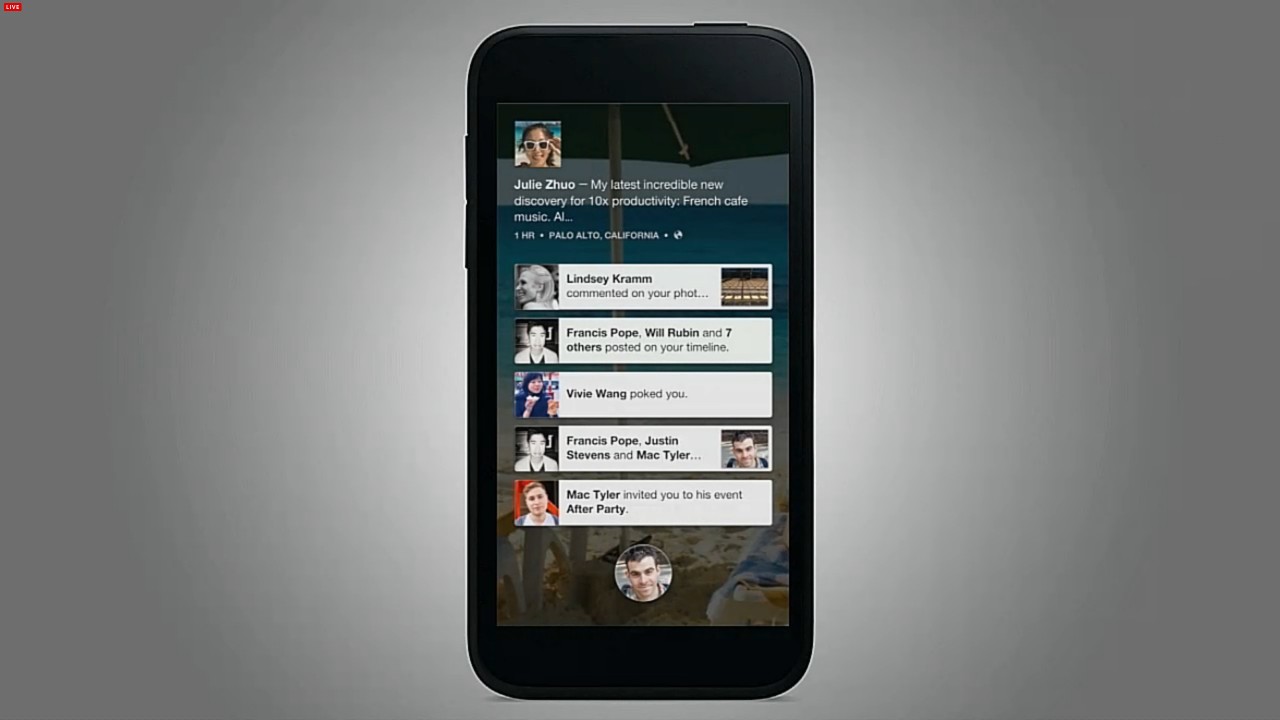Facebook Home presents questions for Android
Back in early 2012, Facebook’s Apple (NASDAQ:AAPL[2]) iOS and Google (NASDAQ:GOOG[3]) Android apps were slow and clunky, and frankly, quite painful to use.
And in fact, the company’s IPO flopped because too much of its traffic was coming from the mobile side, where it didn’t make much money. (See: Facebook's Q1 Results Indicate Further Deterioration in Growth and Monetization Metrics[4].)
But look how quickly things turned around.
In August 2012, Facebook launched a spectacularly improved iOS app, and followed that up with an Android equivalent in December 2012.
The improved apps, combined with a more aggressive mobile ad push, resulted in Facebook taking in $305 million in mobile ad revenue -- 23% of total revenue -- in the fourth quarter of 2012.
And now, Facebook is taking its mobile efforts to the next level with its Home initiative, which is rather unique in that it carries zero risk and has huge upside potential.
The heart of it all is the well-reviewed Home app for Android, which basically transforms several popular Android smartphones into Facebook-centric devices. For example, while a Home-equipped phone is locked, it displays Facebook updates, which is a great way to induce people into spending more time on Facebook.
And secondly, Facebook collaborated with HTC (TPE:2498) to produce the HTC First, which, courtesy of its pre-loaded Home app, is effectively a Facebook phone.
Now, there is a small but vocal group of techies criticizing the idea of a Facebook-centric smartphone experience, but they’re missing the point. Let's remember a few things.
First, the serious tech enthusiasts that populate the blogosphere are not the target audience -- the general public is. And Facebook is now a part of the general public's daily lives. For now, it ain't going anywhere.
And from a financial standpoint, these initiatives can fail, and Facebook won’t be hurt one bit. In the worst case scenario, there will be some lost sunken costs that went into developing the Home Initiative.
No big whoop -- people will still use Facebook on desktops or via standard mobile apps.
However, if the Home concept can further entrench Facebook into users’ everyday lives, then it’s an absolute home run for the company.
 Facebook Home will display updates even while a phone is locked.
Facebook Home will display updates even while a phone is locked.The really interesting question is whether Google will ever tire of this type of fragmentation of the Android user experience.
We've already seen Amazon (NASDAQ:AMZN[5]) use a forked version of Android to drive traffic to its own App stores, which is a commercialization of Android that does not at all help to build the Google-branded Android ecosystem. (See: Amazon's Kindle Fire HD Is a Menace to Android and a Friend to the iPad[6].)
Additionally, smartphone manufacturers like HTC and Samsung (PINK:SSNLF[7]) already slap their own customized skins on top of Android.
And now, Facebook Home is altering the Android interface in yet another way.
This strongly contrasts with Apple's strategy of emphasizing simplicity and consistency, which has an ancillary benefit in that it makes app development way easier.
Could you imagine if Facebook tried to put Home on the iPhone, especially under Steve Jobs?
Forget thermonuclear. I bet Steve Jobs would walk straight into Facebook headquarters, look Mark Zuckerberg in the eye, and say, "I'ma get medieval on your app!"
And he'd kind of be right to do so.
What's the point of building a brand and user experience if anyone's allowed to walk in and twist it around for their own financial ends?
There's a reason Microsoft (NASDAQ:MSFT[8]) still has the majority of PC market share (though that market is certainly not easy right now). There's consistency in the user experience between devices. If you use a Windows PC at work, you'd probably get one for home because you would know how to use it.
The long-term danger is that Android itself becomes in effect a dumb pipe leading to other companies' pocketbooks.
Look at what's happening now: On the Samsung Galaxy S4 website[9], I can't find any mention of Android.
Same with the HTC First site.[10]
What do you think? Does Samsung want to sell Android? Or does Samsung want to sell Samsung?
Twitter: @MichaelComeau[11]
Also see:
Google Fiber Isn't the Telco-Dropping Sucker Punch We Need It to Be[12]
The PC Isn't Dead, It's Just Gone 'Ultramobile'[13]
A Budget iPhone Is a Bad Idea[14]
Tech News: Apple Scores Patent for Selling Music Offline[15]
Follow the markets all day every day with a FREE 14 day trial to Buzz & Banter. Over 30 professional traders share their ideas in real-time. Learn more.[16][17]
[1]Copyright 2011 Minyanville Media, Inc. All Rights Reserved.
References
- ^ Facebook (finance.minyanville.com)
- ^ Apple Inc. - Common Stock (finance.minyanville.com)
- ^ Google Inc. - Class A Common Stock (finance.minyanville.com)
- ^ Facebook's Q1 Results Indicate Further Deterioration in Growth and Monetization Metrics (rssfeeds.usatoday.com)
- ^ Amazon.com, Inc. - Common Stock (finance.minyanville.com)
- ^ Amazon's Kindle Fire HD Is a Menace to Android and a Friend to the iPad (www.minyanville.com)
- ^ SSNLF (finance.minyanville.com)
- ^ Microsoft Corporation - Common Stock (finance.minyanville.com)
- ^ Samsung Galaxy S4 website (www.samsung.com)
- ^ HTC First site. (www.htc.com)
- ^ @MichaelComeau (twitter.com)
- ^ Google Fiber Isn't the Telco-Dropping Sucker Punch We Need It to Be (www.minyanville.com)
- ^ The PC Isn't Dead, It's Just Gone 'Ultramobile' (www.minyanville.com)
- ^ A Budget iPhone Is a Bad Idea (www.minyanville.com)
- ^ Tech News: Apple Scores Patent for Selling Music Offline (www.minyanville.com)
- ^ FREE 14 day trial to Buzz & Banter. (mvp.minyanville.com)
- ^ Learn more. (mvp.minyanville.com)









